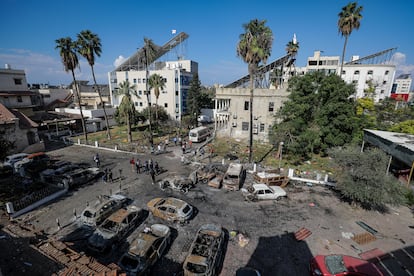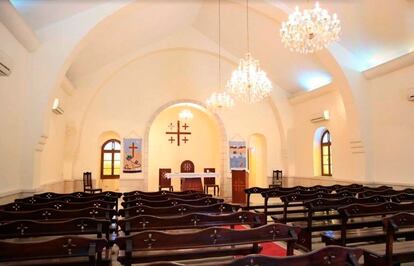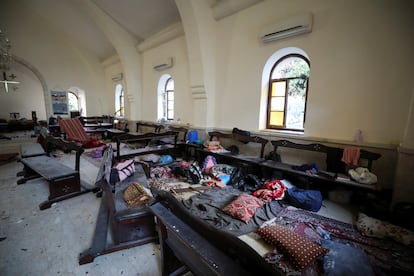A massacre without a clear perpetrator: What the world knows (and what it doesn’t) about the attack on the Gaza hospital
Joe Biden accepts Israel’s accusation against Islamic Jihad for launching a failed rocket that hit the al-Ahli hospital while Gazan authorities blame Israel for the tragedy


The tragedy of Tuesday night’s explosion at the al-Ahli Hospital in Gaza City has caused an extreme twist in the war that the Israeli army has been waging against militias in the Gaza Strip since the surprise Hamas attack launched against Israel on October 7. Israeli military spokesmen have blamed Islamic Jihad for the launching of a rocket that struck the hospital, killing at least 500 people according to initial estimates by the Hamas-run Gaza Health Ministry, which later lowered the figure slightly: a spokesman for the ministry put the toll at 471. Some analysts believe that the final number of victims will be considerably lower. To this end, they have provided videos of the explosion, audio recordings among Palestinian militiamen, as well as graphics and visual analysis. On the same day as the explosion at the hospital, Israel had bombed a United Nations Relief and Works Agency for Palestine Refugees in the Near East (UNRWA) school in the Al Maghazi refugee camp, killing six civilians.

What happened on Tuesday?
After 8 p.m. local time, Al Jazeera began to report on a devastating attack on the al-Ahli Hospital in the Gazan capital. Within minutes, Health Ministry officials in the Gaza Strip, which has been controlled by Hamas since 2007, cited the death toll over 500 and added that several hundred more people remained trapped under rubble. This information was reported by international agencies after 8:30 p.m., quoting Al Jazeera as a source. On Wednesday, a spokesman for the ministry said that the number of people killed in the attack on the hospital had risen to 471.
What was Israel’s response?
The Israel Defense Forces (IDF) issued a version of events that contradicted that of the Gazan authorities at 10:36 p.m. “An analysis of IDF operational systems indicates that a barrage of rockets was fired by terrorists in Gaza, passing in close proximity to the al-Ahli Hospital in Gaza at the time it was hit. Intelligence from multiple sources we have in our hands indicates that Islamic Jihad is responsible for the failed rocket launch which hit the hospital in Gaza,” the IDF said in a statement a few hours after the attack on its official X account.
Israeli Prime Minister Benjamin Netanyahu joined in this discourse at 11:28 p.m. on his personal X profile: “The entire world should know: It was barbaric terrorists in Gaza that attacked the hospital in Gaza, and not the IDF. Those who brutally murdered our children also murder their own children.”
On Wednesday morning, Daniel Hagari, a spokesman for the Israeli army, gave a press conference in which he reiterated the same version as Tuesday night, providing a series of images that he said would prove that the cause of the explosion was a Palestinian rocket and not an Israeli one. “The investigation confirmed that there was no IDF fire from the land, sea or air that hit the hospital,” Hagari said. The spokesman based this on analysis of the absence of structural damage to the hospital buildings and the lack of impact craters consistent with an airstrike.
“Most of this damage would have been done due to the propellant, not just the warhead,” added Hagari, who also accused Hamas of inflating the number of deaths and injuries caused by the blast. The spokesman has also distributed audio of an allegedly recorded conversation between Hamas members, in which they acknowledge that the massacre was caused by an Islamic Jihad missile. The authenticity of this audio, however, could not be verified.
The entire world should know: It was barbaric terrorists in Gaza that attacked the hospital in Gaza, and not the IDF.
— Benjamin Netanyahu - בנימין נתניהו (@netanyahu) October 17, 2023
Those who brutally murdered our children also murder their own children.
What has the United States said?
U.S. President Joe Biden, who visited Israel on Wednesday, said during a press conference with Netanyahu: “Based on what I’ve seen, it appears as though it was done by the other team, not you. But there’s a lot of people out there who are not sure. So we’ve got to overcome a lot of things.” Hours later Adrienne Watson, a spokeswoman for the White House National Security Council, stated that based on the data available to her at the time, “Israel is not responsible for the explosion at the hospital in Gaza.” Washington reached this initial assessment based on “intelligence, missile activity, and open source video and images of the incident.” Watson, however, said that the U.S. is still gathering information about what happened.
What has Islamic Jihad said?
Islamic Jihad, which Israel and the U.S. appear to blame for the launch, on Wednesday rejected its responsibility and accused Israel, according to news agency EFE. The Islamist movement, the second-largest in Gaza after Hamas, accused the government of Benjamin Netanyahu of “lies” and of “trying hard to evade responsibility for the brutal massacre it committed.”
“The accusations promoted by the enemy are baseless,” Islamic Jihad said in a statement, adding that the group “does not use places of worship or public facilities, especially hospitals, as military centers or weapons stores.”
The group has pointed to “the presence of reporters, eyewitnesses and videos filmed at the time of the bombing” as evidence that would support its version. It also referred to “the weight of the explosive head, the angle of the bomb’s fall and the magnitude of the destruction” that took place in the hospital compound. According to the Islamist group, this constitutes “documented evidence confirming it was an aerial bombardment from a fighter plane.”


What information do the images provide?
The BBC’s video verification service, BBC Verify, has analyzed some of the videos circulating on social networks. A 20-second video was, according to the British public television service, the first significant visual evidence of the incident. It shows the whistling of a shell and, immediately afterwards, an explosion and a huge fire. Footage broadcast by Al Jazeera at 6:59 p.m. local time shows a bright light rising over the Gaza sky. Some commentators quoted by the BBC suggest it is a rocket that appears to explode or disintegrate. The images show a flash in the distance, followed by a much larger explosion. Other social media images appear to show the same explosion from different angles and distances.
BBC Verify says the findings are “inconclusive” in determining the cause of the explosion or whether it was an Israeli or Palestinian projectile. Some weapons experts consulted by the BBC consider that the images of the explosion are “not consistent with what you would expect from a typical Israeli air strike with a large munition.” The BBC quotes J. Andres Gannon, assistant professor at Vanderbilt University, who maintains that “the evidence looks like the explosion was caused by a failed rocket section hitting the car park and causing a fuel and propellant fire.”
Israel maintains that if the incident had been caused by one of its attacks, it would have generated a large crater. The images that the BBC has so far only show one about a meter wide, but it says it is looking for additional images. As yet, no images of the remains of a projectile have been discovered, which would make it easier to determine its origin.
Sign up for our weekly newsletter to get more English-language news coverage from EL PAÍS USA Edition
Tu suscripción se está usando en otro dispositivo
¿Quieres añadir otro usuario a tu suscripción?
Si continúas leyendo en este dispositivo, no se podrá leer en el otro.
FlechaTu suscripción se está usando en otro dispositivo y solo puedes acceder a EL PAÍS desde un dispositivo a la vez.
Si quieres compartir tu cuenta, cambia tu suscripción a la modalidad Premium, así podrás añadir otro usuario. Cada uno accederá con su propia cuenta de email, lo que os permitirá personalizar vuestra experiencia en EL PAÍS.
¿Tienes una suscripción de empresa? Accede aquí para contratar más cuentas.
En el caso de no saber quién está usando tu cuenta, te recomendamos cambiar tu contraseña aquí.
Si decides continuar compartiendo tu cuenta, este mensaje se mostrará en tu dispositivo y en el de la otra persona que está usando tu cuenta de forma indefinida, afectando a tu experiencia de lectura. Puedes consultar aquí los términos y condiciones de la suscripción digital.








































